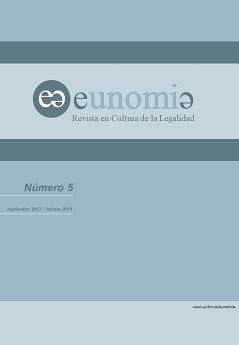Persiguiendo la tesis convencionalista
Resumen
El autor ofrece en este trabajo una presentación del convencionalismo jurídico, entendido como aquella posición que defiende la tesis convencionalista acerca del derecho. Según esta tesis el hecho jurídico fundamental es (determinado por) una convención. Para precisar el contenido de la tesis el autor propone, siguiendo el trabajo de otros autores, distinguir, primero, entre dos nociones de convención: una basada en el acuerdo y otra no basada en el acuerdo; segundo, entre distintos niveles de convencionalidad; y tercero, entre dos tipos de convenciones, a saber, aquellas que solucionan un problema de coordinación recurrente, denominadas convenciones de coordinación, y aquellas que definen una práctica y establecen cómo participar en ellas, denominadas convenciones constitutivas. Luego de analizar las versiones tradicionales de la tesis convencionalista que intentaron dar cuenta de regla de reconocimiento, el autor propone una versión de la tesis convencionalista que distinga dos etapas dentro de la práctica de identificación del derecho. Por un lado la identificación de los textos jurídicos a la que concibe como un convención de coordinación y, por otro lado, la atribución de significado a tales textos a partir de ciertos métodos interpretativos, a los que concibe como convenciones constitutivas.
Descargas
Eunomía. Revista en Cultura de la Legalidad es una revista debidamente registrada, con EISSN 2253-6655.
Los textos publicados en esta revista están –si no se indica lo contrario– bajo una licencia Reconocimiento-Sin obras derivadas 3.0 España de Creative Commons. Puede copiarlos, distribuirlos y comunicarlos públicamente siempre que cite su autor y la revista y la institución que los publica y no haga con ellos obras derivadas. La licencia completa se puede consultar en: http://creativecommons.org/licenses/by-nd/3.0/es/deed.es




